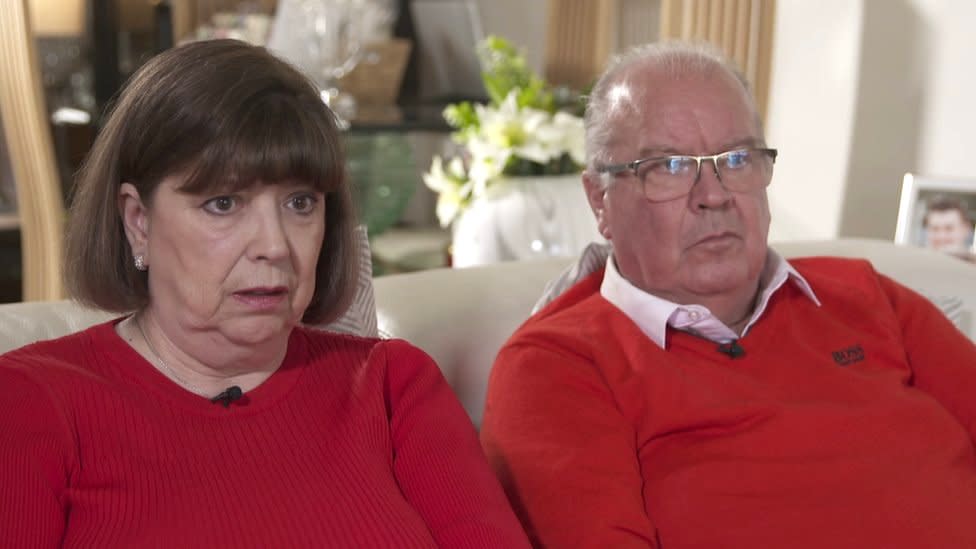'My son's body was butchered in a post-mortem'
A bereaved mother who says her son was "butchered" in a post-mortem she had not agreed to is to meet the lord advocate in her bid to have the law changed.
Ann Stark's 25-year-old son Richard died suddenly at home on 7 June, 2019. She later learned a full autopsy had taken place.
She said it then took 11 months to have tissue samples returned.
Mrs Stark is calling for an overhaul of the post-mortem system in Scotland.
Both she and her husband Gerry want to prevent other grieving relatives from having to go through the trauma they have suffered.
Richard, an accountant from Bothwell in South Lanarkshire, first showed signs of having a seizure in February 2019 and went to hospital but he was never sent for further checks.

After being found dead in his bed, Mrs Stark said she told police officers she only wanted a "view and grant" post-mortem - which is an external look around the body and not a full invasive examination.
Three weeks later she was horrified to learn that a full post-mortem examination had taken place, including the removal of Richard's brain. Two years later, the couple found out his throat and tongue had also been removed.
She told BBC Scotland News: "I was absolutely raging. I thought 'I handed my son to you, I trusted you with my son and you've butchered him'."
It took almost a year for 65 tissue samples to be returned to the couple but five years later they are still trying to get other samples back after they were distributed to universities across Scotland.
Mrs Stark said: "Richard's death was not suspicious at all. So a post-mortem was not necessary.
"I cannot have another family going through this. Non-suspicious deaths are not criminal. They are destroying the lives of the next of kin. We will never get over that.
"I put my trust in them with my son. My trust has gone."
Mr Stark added: "When a tragedy like this happened you're obviously in shock. You expect that the people who come into your house - police, doctors, etc - are professionals and you can trust them with doing the right thing."
He said the couple had been told by the procurator fiscal's office to stop writing to them.
"I've now lost all confidence with hospitals. with doctors, procurator fiscals and even the Crown Office," he said.
Mrs Stark has petitioned the Scottish Parliament in a bid for the rules to be changed so post-mortems can only be carried out with permission of the next of kin.
Holyrood's public petitions committee is considering the call for a review of the current legislation.
The couple also want CT scanners and keyhole surgery to be used as often as possible instead of invasive autopsies. They are already being used for digital autopsies in some parts of England.
"Give the deceased some dignity and respect," Mrs Stark said.
"Richard was such a caring boy to other people. I want him to leave a legacy behind.
"I cannot have other parents going through this. In the two years that I've had this petition in, many a poor deceased person has been violated, mutilated, butchered. That is wrong.
"The procurator fiscal stripped me of being a protective mum. They took that away from me," she said.
Dr James Adeley, a senior coroner in Lancashire, who features in the Channel 5 TV series Cause of Death, told BBC Scotland News they had been carrying out CT scanning for about seven years.
"This gives us a cause of death in up to 94% of cases within 48 to 72 hours," he said. "It doesn't always replace pathology but it replaces the vast majority of cases where an invasive post-mortem is necessary.
"It's very much more considerate to the needs of bereaved families."
Lord advocate meeting
Mrs Stark is due to meet Lord Advocate Dorothy Bain on Wednesday.
She is eventually hoping for non-suspicious deaths to be taken out of the procurator fiscal's remit and for next of kin to be given a likely cause of death and the choice as to whether a post-mortem should be carried out in non-suspicious deaths.
The couple would also like a written apology.
The Crown Office and Procurator Fiscal Service (COPFS) is responsible for the investigation of all sudden, suspicious, accidental and unexplained deaths in Scotland.
A spokesman said: "The lord advocate appreciates the profound loss Mr and Mrs Stark suffered with the untimely death of their son Richard.
"The procurator fiscal, who investigates deaths independently on the lord advocate's behalf, seeks to answer questions about why a death has occurred and post-mortem examinations are often necessary to do this.
"We recognise the impact that the post-mortem and investigation process can have on bereaved families.
"The lord advocate has previously said she would support any proposals for change which fully meet the requirements of death investigation in a timely and cost-effective manner, whilst reducing distress to families."
COPFS said post-mortem examinations were only instructed when necessary to establish the cause of death.
It added that it was a matter for individual pathologists to determine the nature and extent of the examination required as they had the professional responsibility to certify the cause of death to "the best of their knowledge and belief".
